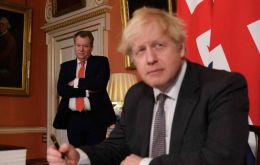MercoPress. South Atlantic News Agency
Tag: David Frost
-
Monday, December 20th 2021 - 09:02 UTC
Brexit minister resignation deals yet another blow to Boris Johnson

Career diplomat David Frost handed in his resignation to his job as a British negotiator in the post-Brexit phase, citing his disagreement with the direction taken by Boris Johnson's government, thus dealing yet another blow to the Prime Minister's image.
-
Tuesday, November 9th 2021 - 09:10 UTC
A UK-EU trade war?

By Gwynne Dyer – International treaties are serious business. A lot of time and effort goes into negotiating them and they become part of international law. It’s very rare for a politician to say, only a couple of years after negotiating a treaty, that his country always felt it was “a little bit provisional and open to review.
-
Wednesday, October 13th 2021 - 07:55 UTC
Northern Ireland protocol: UK/EU on collision course heading for a trade war?

The question of Northern Ireland's post-Brexit trading arrangements, better known as the EU/UK Trade and Cooperation Treaty, has the United Kingdom and the European Union on a collision course.
-
Friday, October 16th 2020 - 09:01 UTC
Critical Friday for post-Brexit talks: EU insists Johnson must make concessions

The negotiations between Britain and the European Union over their future relationship are lurching toward a crisis after European Union leaders told Boris Johnson he must make concessions only hours before the prime minister is due to decide whether to walk away.
-
Tuesday, September 8th 2020 - 08:48 UTC
Johnson calls for “more realism”, ahead of a new round of EU/UK post Brexit trade talks

Britain demanded “more realism” from the European Union on Monday ahead of crucial post-Brexit trade talks, but the mood was soured by reports that London was looking to rewrite an agreement the two sides had already signed.
-
Friday, July 3rd 2020 - 08:02 UTC
UK/EU post Brexit negotiations remain stalled and “serious divergences remain”

Britain and the European Union (EU) failed to make progress in talks on post-Brexit relations this week due to major differences and called off a one-on-one meeting between their chief negotiators, officials said on Thursday.
-
Thursday, May 28th 2020 - 07:20 UTC
Boris Johnson will resume Brexit talks next month in Brussels

British Prime Minister Boris Johnson will resume Brexit talks in Brussels next month, the Times newspaper reported on Thursday. Britain's negotiator with the European Union, David Frost, said Johnson will meet the presidents of the European Commission and Council to formally assess the state of the talks, according to the newspaper.
-
Saturday, May 16th 2020 - 07:49 UTC
Britain-EU round of post Brexit talks end with scant progress

Britain and the European Union urged each other on Friday to give ground in talks over a post-Brexit trade deal or risk failure in tetchy exchanges after the latest bout of bargaining ended with scant progress.
-
Saturday, January 11th 2014 - 07:54 UTC
UK launches scheme to protect Scotch whisky industry from fake products

A new scheme has been launched to protect the Scotch whisky industry from fake or sub-standard products. The Spirit Drinks Verification Scheme has been set up by the UK government to help consumers identify genuine UK-made products.
